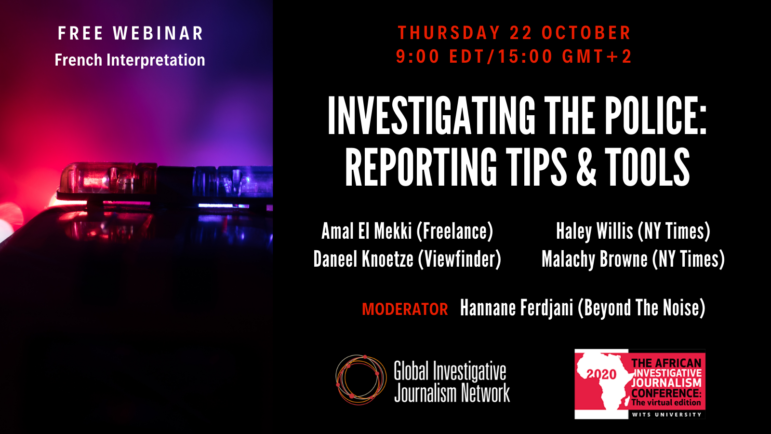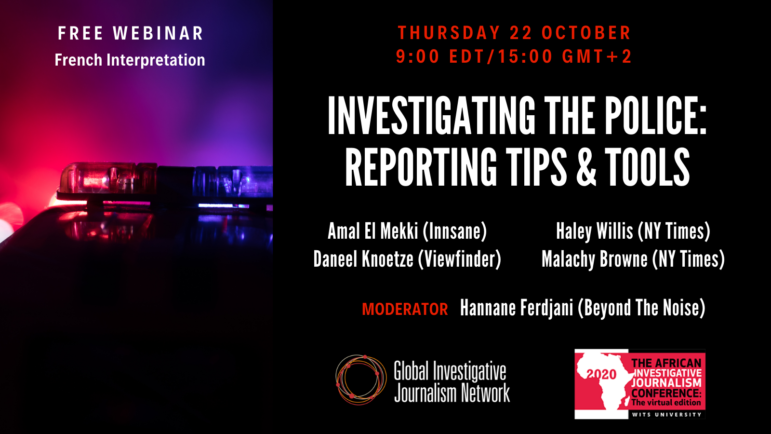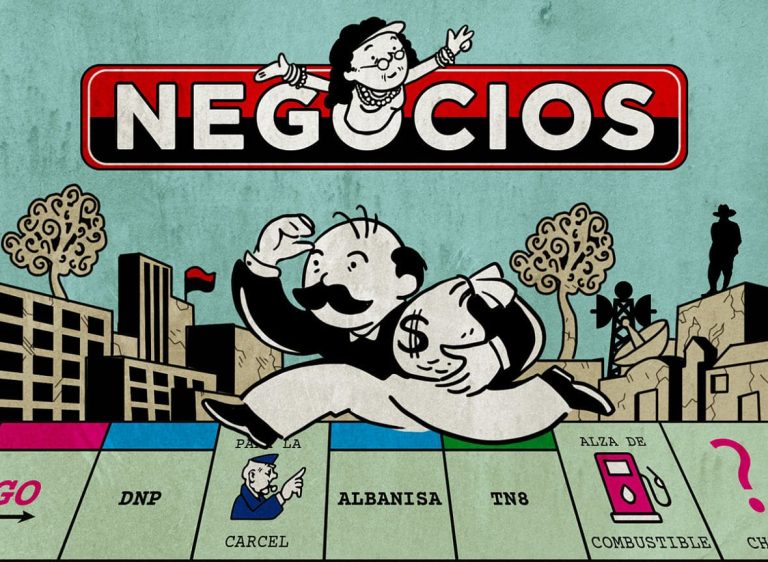

Investigating the Police: Reporting Tips & Tools
Editor’s note: This webinar has now taken place. You can see the recording on GIJN’s YouTube channel.
Police forces are supposed to uphold the law and protect citizens from violence. However, all too often the police themselves are corrupt and violent, even in countries that claim to be democratic. Investigating cases of official misconduct, corruption and aggression, and challenging official narratives, stand at the heart of investigative journalism. In addition, journalists not only frequently rely on police accounts as primary sources but at times are themselves victims of excessive force and detention by police and other security forces.
In this global GIJN webinar, Investigating the Police: Reporting Tips and Tools, co-organized with the African Investigative Journalism Conference, we bring together four experienced journalists: two from Africa and two from outside the continent, who have investigated law enforcement. They will share their experience and reporting techniques ranging from source development to forensic analysis.
- Amal El Mekki (@ElMekkiAmal) is editor-in-chief of Innsane, a storytelling platform she co-founded in May 2020. She focuses on human rights and has worked with Tunisian media and international outlets. Her investigation, “S17: Victims of the Ministry of Interior’s Whim” revealed how the Tunisian Interior Ministry’s illegal border practices prevented thousands of Tunisians from traveling abroad. She is the first Tunisian journalist to win an access of information case against the Interior Ministry.
- Daneel Knoetze (@danknoetze) is the founder and editor of Viewfinder, an accountability journalism nonprofit in South Africa. His reporting focuses on police criminality and the failure of police oversight mechanisms in South Africa. He is a graduate of Rhodes University and, in 2017-18, was a Hubert H. Humphrey Fellow in the United States, where he worked with Reveal at the Center for Investigative Reporting in San Francisco.
- Haley Willis (@heytherehaley) is a Visual Investigations reporter with the New York Times video team, where she combines traditional reporting with more advanced digital forensics. Prior to joining The Times, she worked as an open source researcher with the Human Rights Center at the University of California at Berkeley and as a project manager with Amnesty International’s Digital Verification Corps. She also worked with Bellingcat’s Yemen Project.
- Malachy Browne (@malachybrowne) is a senior story producer on the Visual Investigations team at The New York Times, where he recently conducted a series of investigations on race and policing. He was part of a team that won a Pulitzer Prize in 2020 for international reporting for coverage of Russian culpability in crimes around the world, including the bombing of hospitals in Syria.
This webinar will be moderated by Hannane Ferdjani (@HFerdjani), a multimedia journalist with extensive experience as a TV reporter, presenter and producer in Africa and Europe, and a Nieman Fellow. She is the founder of #BeyondTheNoise, a weekly online news program that aims to provide relevant and reliable information about Africa to a connected African audience.
Note on Future Sessions:
For those of you attending the Africa Investigative Journalism Conference, we hope you can join us again on Tuesday 27 October at 9:30 EST – 15:30 in Johannesburg – for a two-hour online session on sustainability in independent journalism. Also at AIJC, our Africa editor Benon Oluka moderated a session that discussed the challenges of investigative journalism in the continent. And we hope everyone can join us for the global GIJN webinars continuing this month and next. Watch our Twitter feed @gijn and newsletter for details on future events.










